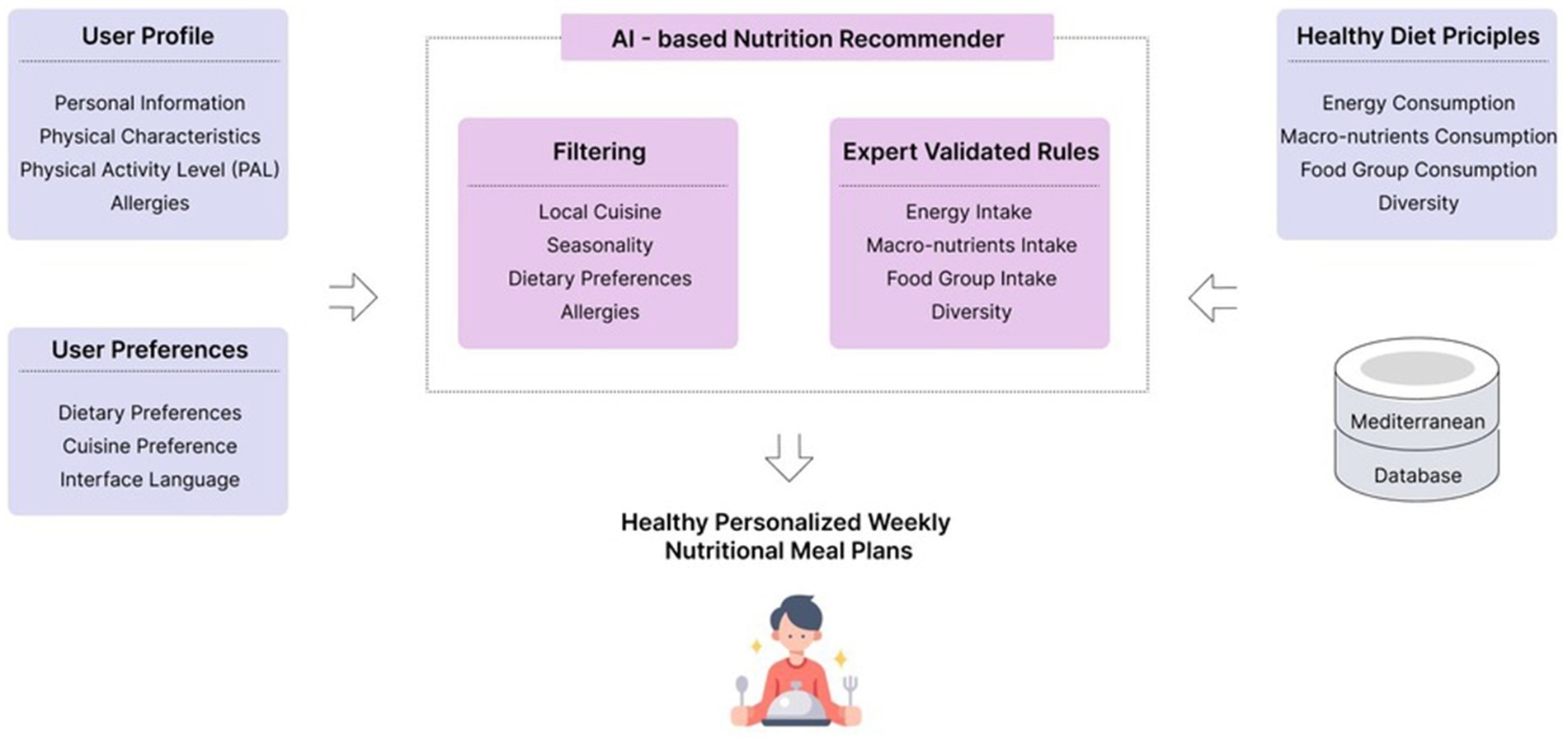A new AI system delivers personalized weekly menus rooted in Mediterranean cuisine, balancing taste, nutrition, and cultural needs, unless you have a nut or dairy allergy.

Study: An AI-based nutrition recommendation system: technical validation with insights from Mediterranean cuisine. Image Credit: Dragon Images / Shutterstock
Chronic or lifestyle diseases, including stroke, heart attack, obesity, and type 2 diabetes, are on the rise, largely due to switches in dietary and physical activity habits. Artificial intelligence (AI) is being pressed into service to formulate personalized, balanced meal plans for healthy individuals that fit their tastes and needs.
A recent paper published in the journal Frontiers in Nutrition presents an AI-based nutritional recommendation (AINR) system that produces weekly meal plans from a Mediterranean menu, conforming to calorie and macronutrient recommendations while enforcing food diversity and dietary rules.
Introduction
Most people know that they need to be physically active and eat a balanced diet. Work habits, family schedules, and financial resources often hinder the adoption of such habits. To wean them off junk food, experts explored the feasibility and efficacy of nutrition recommendation systems. These are designed to help users choose their best diets for long-term compliance and improved health.
AI is now being leveraged to produce optimal meal plans based on user dietary choices and needs, including allergies, seasonality, cultural factors, and calorie needs. While Large Language Models (LLMs) like ChatGPT represent emerging approaches in nutrition AI, the current AINR uses rule-based methods instead.
Traditional vs. AI-based systems
Such nutrition recommendation systems may be categorized as traditional and AI-based systems.
Traditional systems
The first kind of system uses four types of approaches to plan meals:
- Combinatorial optimization techniques
- Content-based filtering
- Collaborative filtering
- Hybrid approaches
Combinatorial analysis aims to ensure adequate variety in the diet and includes all food groups, achieving cost efficiency while respecting user preferences. Despite their mathematical soundness, the algorithms used here may not accurately reflect user goals and choices. They also oversimplify nutritional rules, while narrowing the field of food diversity. These limitations restrict its applicability to actual meal planning in real life.
The other three types of approach correlate user preferences and/or the food attributes to personalize food suggestions. They draw on past interactions or user profiles to suggest similar foods to those represented on the user profile in use, or other users with a similar profile. Hybrid approaches aim at blending the best parts of these methods to optimize and increase the relevance of the meal plan still further.
AI-based systems
AI-based nutrition recommendation systems were designed to overcome the obstacles of having too little data in many key areas, scalability issues, and having to deal with a cold start. These weight user dietary restrictions (like allergies or cultural taboos) and health goals, as well as nutritional content. Both knowledge-based and machine learning (ML)-based systems are currently used in such systems.
Knowledge-based systems are represented by the many-objective optimization (MaOO) approach and the Meal Plan Generator (MPG) mechanism, or the Protein-AI-advisor, which compiles weekly meal plans based on already preset nutritionally balanced meals in keeping with user needs and diet rules. Conversely, ML-based platforms learn from the context and the user behavior and expressed preferences to come up with daily personalized meal plans.

AI-based nutrition recommender (AINR). The AINR is fed with the user’s profile and preferences, with healthy diet principles, and foods from a Mediterranean meals and dishes database. The core of the AINR processes this information using expert-validated rules and filtering mechanisms to propose healthy personalized weekly meal plans to users.
About the study
The current study presents an AINR designed to provide weekly meal plans based on the Mediterranean diet, either Spanish or Turkish. The system was tested on 4,000 generated user profiles, including those with allergies (dairy, eggs, nuts, fish) and preferences (halal).
How it works
The aim was to prepare a weekly Nutrition Plan using a rigorous four-step process:
- Filter meals by seasonality and local cuisine
- Exclude meals conflicting with allergies/preferences
- Generate and score daily meal plans against energy/macronutrient targets
- Assemble weekly plans enforcing food diversity rules (e.g., max three fish servings/week, no repeated dishes >3x/week)
Importantly, human oversight is required as auto-generated plans aren't nutritionist-validated.
Study results
The results demonstrated 100% filtering accuracy for country, allergies, preferences, and seasonality. However, weekly plans were only generated for ~90% of profiles:
- Spanish users with milk/nut allergies received 0% viable plans due to database gaps (e.g., no Spanish breakfast options for milk-allergic users)
- Turkish male profiles showed lower accuracy (87% calories, 66% protein)
- Spanish users and Turkish females achieved 98% calorie accuracy and >90% macronutrient accuracy
Milk and nut allergies prevented weekly planning, especially for Spanish users, due to limited database options. The AINR system needs database expansion with dairy substitutes and, most importantly, real-world validation.
Conclusions
The AINR system "holds promise in facilitating more balanced dietary habits" but requires database improvements for allergies and Turkish male users. The researchers will test it with real users in the SWITCHtoHEALTHY intervention and plan to extend it for family meal planning.
Journal reference:
- Kalpakoglou, K., Calderon-Perez, L., Boque, N., et al. (2025). An AI-based nutrition recommendation system: technical validation with insights from Mediterranean cuisine. Frontiers. doi: https://doi.org/10.3389/fnut.2025.1546107